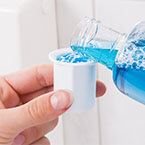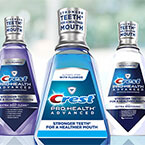The History of Mouthwash

Table of Contents
Oral Hygiene Dates Back to Ancient Times
Anthropologic evidence suggests that many ancient cultures practiced regular oral hygiene. In fact, researchers have found recipes for teeth-cleaning and breath-freshening preparations that date to ancient Egyptian, Chinese, Greek, and Roman cultures. The ingredients have included materials such as charcoal, fruit and dried flowers, but there's no credible evidence about effectiveness of these products.
When Was Mouthwash Invented?
Mouthwash was developed in the late 1800s. Oral care products as we know them first appeared on the scene when toothpaste was developed in the 1800s. Mouthwash was first mass-produced commercially in the late 1800s. Most of the early brands of mouthwash contained alcohol to stabilize the formula, but today alternative products provide germ-killing properties without needing alcohol stabilization, such as cetylpyridinium chloride (CPC). CPC is found in many health care products; the germ fighting ability depends upon the formula, with some products being effective for killing germs that cause both plaque and gingivitis.
But it wasn’t until 1976 that researchers first discovered the plaque fighting benefits of chlorhexidine mouthwash. The powerful topical antiseptic is available by prescription only to help combat gum disease.
Surprisingly alcohol-free mouthwash wasn’t introduced in the United States until the early 1990s. These fluoride formulas can help prevent cavities, reverse gum disease, and even whiten teeth.
Mouthwashes for Special Needs
Today, you can also find mouthwashes for unique needs, such as sensitive mouths, receding gums, or braces, and for those who prefer natural products. In fact, the variety of mouthwashes and rinses available has increased dramatically in the past few decades. But the scientific evidence for effectiveness of “natural mouthwash” remains limited to improving breath and preventing plaque buildup.
Fluoride rinses are especially important in preventing tooth decay, and this can benefit can even extend beyond the mouth. Studies have shown that oral care is linked to overall health, particularly diabetes. The best mouthwash for diabetics is one that helps protect against dry mouth and plaque buildup.
The Bottom Line with Mouthwash
It's essential to remember that no mouthwash is a replacement for a regular oral care routine of twice-daily brushing and daily flossing. So even if your dental professional recommends or prescribes a mouthwash, you still need to follow your complete oral care routine to maintain good dental health.
Only from Oral-B, the #1 brand used by dentists worldwide*.
*BASED ON SURVEYS OF A REPRESENTATIVE WORLDWIDE SAMPLE OF DENTISTS CARRIED OUT FOR P&G REGULARLY
Table of Contents
- Oral Hygiene Dates Back to Ancient Times
- When Was Mouthwash Invented?
- Mouthwashes for Special Needs
- The Bottom Line with Mouthwash
-
- Sources
- Related Articles

Sign Up
for expert advice and exclusive offers

Sign Up
for expert advice and exclusive offers





